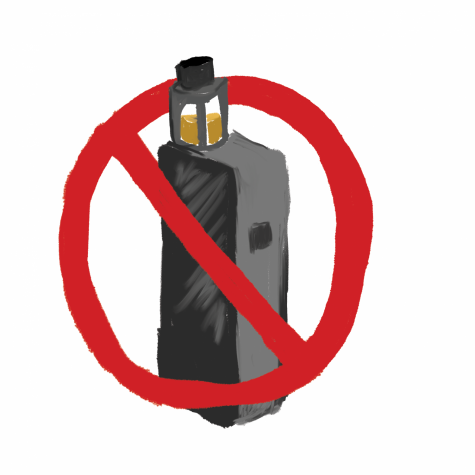Gov. proposes permanent vape ban
January 22, 2020
Washington Gov. Jay Inslee has proposed legislation, SB 6254, which would make the current statewide ban on flavored vaping products permanent. The current ban was originally proposed as a temporary stopgap until the Centers for Disease Control and Prevention (CDC) completed an investigation into multiple cases of lung illness which were linked to vaping products. The current emergency ban is set to expire on Feb. 6.
Across the state, thousands have been affected by the initial temporary ban. According to a House Finance Committee report released in November 2019, the tax revenue lost by implementing a permanent ban could amount upwards of $50 million over the next four years.
Ellensburg saw the closure of Ruze 509 which employed three people and sold to many in the community. However, some have still been able to get their fix, such as one junior ITAM major who wished to remain anonymous.

“A few of my friends stocked up before the ban went into place and since then we’ve also been able to just go to the Yakama reservation and get juice there,” the student said. “I don’t think the ban is a good idea, it’s just going to make more of a black market. I’ve heard it’s really bad in high schools.”
Other CWU students disagree with the ban for a variety of reasons, including CWU sophomore Lauren Miller.
“I feel like if you’re able to go and fight for your country, go to kill in a different country, why can’t you hit a Juul?” Miller said. “It wasn’t even nicotine that was hurting people, it was literally black market dab cartridges.”
That is true, as the CDC did find that out of the 23 cases of lung injury since April 2019 that were linked to vaping products, nine contained tetrahydrocannabinol (THC). The CDC has determined that vitamin E acetate, an additive in many legal and illegal THC vaping products, was strongly linked to the cases of lung illness. Out of those affected who reported using THC products, 78% reported only acquiring products from informal sources rather than from a vape shop.
Lung illness hasn’t been the only reason cited for the vape ban. In discussions about a nationwide vape ban, officials including President Trump pointed to the potential for children and teens to develop a nicotine addiction that they would have otherwise avoided. A National Institute of Health (NIH) study found that young people are most attracted to flavors like mint and mango while adults, many of which are former smokers, preferred flavors like menthol.
“I think they were marketed towards kids,” Miller said. “Like whether or not big tobacco wants to admit it or not, you put out gummy-flavored things and kids are gonna want to buy them.”
Washington State Representative Gerry Pollet echoed this sentiment in an interview with The Seattle Times following the state board of health meeting which approved of the initial vape ban.
“There’s no way that these stores would be supported just by adult smokers without attracting new people to vaping,” Pollet told the Times. “[These companies have] all made a decision to be the purveyors of addiction to young people.”
Whether children were intentionally targeted or not, they do make up a large portion of vapor product sales. According to the state Department of Health, in 2017 over 27% of vape users were between eighth and 12th grade, and five of those 23 whose lungs were injured were under 20.
The owners and managers of vape shops all over the state showed up to that Washington State Board of Health meeting, including Ruze 509 manager Brendan Killeen. Killeen also worked with the Vapor Technology Association and Baron Enterprises LLC which sued the board of health and the department of health shortly after they approved the temporary ban. That lawsuit was eventually struck down by Thurston county judge Chris Lanese.




Hy • Jan 26, 2020 at 5:30 am
Inslee is an idiot